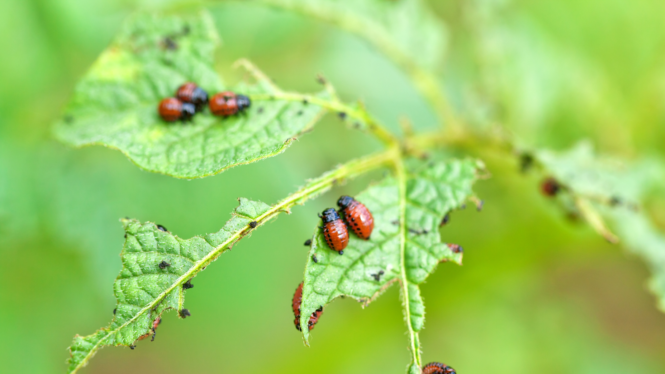- Your cart is empty
- Continue shopping

Introduction
Gardening is a peaceful and fulfilling hobby, but pests and insects can quickly disrupt your efforts. Controlling these pests effectively is crucial for maintaining the health and productivity of your garden. In this blog, we will explore general pest and Insect control Tips to ensure a flourishing garden.
1. Understand Your Garden Ecosystem
Identify Your Pests
The first step in pest control is to identify the pests in your garden. Common pests include aphids, caterpillars, beetles, and slugs. Knowing your pests will help you select the appropriate control methods.

Promote Beneficial Insects
Not all insects are harmful. Beneficial insects like ladybugs, spiders, and predatory beetles can help control pest populations. Planting nectar-rich flowers can attract these helpful insects and naturally keep pest numbers in check.
2. Maintain Healthy Soil
Enhance Soil Quality
One of the best way in pest and insect control Tips Healthy soil is essential for a thriving garden. Regularly incorporate compost and organic materials to enhance soil structure and fertility. Plants that are healthy are better equipped to resist pests and diseases.
Apply Mulch
Applying mulch helps retain soil moisture, suppress weeds, and regulate soil temperature. Organic mulches, such as straw or wood chips, can also deter some pests.
3. Select Resistant Varieties
Choose Disease-Resistant Plants
When planning your garden, opt for plant varieties that are resistant to common pests and diseases. Your plant will not need that sort of chemical treatment
Practice Companion Planting
Companion plant is a practice where you plant two or more plants together to control pests amd weeds and to enhance production For example, marigolds can deter nematodes, and basil can repel aphids and tomato hornworms.
4. Implement Physical Barriers
Use Row Covers
Floating row covers can protect plants from insect pests while allowing light, air, and moisture to reach the plants. Use these especially during the early growth stages.
Install Fencing
A fence can keep larger pests, like deer and rabbits, out of your garden. Make sure it’s tall enough and buried deep enough to prevent animals from jumping over or digging under it.
5. Adopt Proper Watering Practices
Water Early in the Day
Watering early in the morning allows plants to dry out during the day, reducing the chances of fungal infections. Wet foliage can attract pests, so avoid overhead watering if possible.
Use Drip Irrigation
Drip irrigation systems deliver water directly to the plant roots, reducing water waste and keeping the foliage dry. This method can also help reduce the risk of pest infestations.

6. Regular Monitoring and Maintenance
Inspect Plants Regularly
Regularly check your plants for signs of pests, such as chewed leaves, holes, or sticky residue. Being proactive will keep your plant healthy and pest-free
Prune and Clean
Remove dead or diseased plant material promptly to prevent pests from settling in. Regular pruning also improves air circulation and reduces pest habitats.
7. Natural Pest Control Methods
Neem Oil
Use Neem Oil and extracts to scare off the insects. It disrupts the life cycle of insects, making it a good option for long-term control.
Soap Sprays
Insecticidal soaps can be used to control soft-bodied insects like aphids and mites. These sprays suffocate the pests without harming the plants.
Homemade Remedies
Simple homemade remedies, such as a mixture of water and dish soap or a garlic spray, can deter many common garden pests. Test any homemade solution on a small area first to ensure it doesn’t harm the plants.
8. Chemical Control
Use Chemicals as a Last Resort
While chemical pesticides can be effective, they should be used sparingly and as a last resort. Overuse can harm beneficial insects, soil health, and the broader environment.
Follow Instructions Carefully
If you must use chemical pesticides, always follow the manufacturer’s instructions carefully. Wear protective gear and apply the chemicals at the right time to minimize risks to yourself and your plants.
Conclusion
Effective pest and insect control requires a combination of strategies tailored to your specific garden conditions. By understanding your garden ecosystem, maintaining healthy soil, choosing resistant plant varieties, and using physical and natural control methods, you can minimize pest problems and enjoy a thriving garden. Remember, regular monitoring and maintenance are key to preventing pest infestations and ensuring a healthy and productive garden. Happy gardening!
